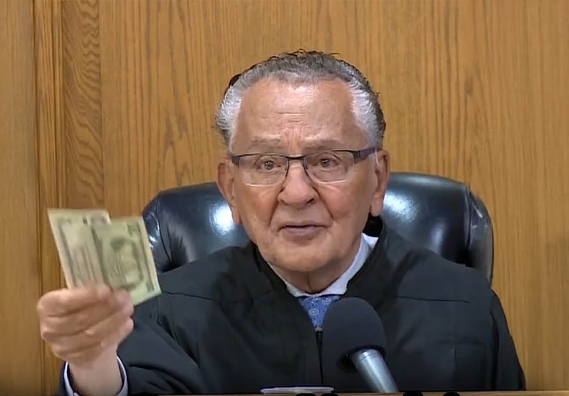The combination of a stellar bench career and an unanticipated rise to digital notoriety is reflected in Frank Caprio’s estimated net worth of roughly $6.3 million at the time of his death. Based on syndication transactions, real estate holdings, and judicial revenue, some sources from previous years have estimated his net worth as high as $13 million; others provided a lower estimate of about $1 million, perhaps taking more conservative measures to account for liabilities and public and private assets. What is strikingly constant, though, is that Caprio’s financial situation was supported not only by his position as a judge but also by his kindness, viral renown, and astute use of the media.

Through the series Caught in Providence, which took the common courthouse into homes, phones, and social media, Caprio gained popularity. Viewers reacted to his decisions, which frequently prioritized justice over formality. Millions of people have viewed his courtroom videos by 2017, and by 2022, there were about 500 million views on all platforms. A strong online presence, syndication, and advertising revenue are the results of that kind of attention, therefore it’s not free. With millions of followers on social media platforms like Facebook, Instagram, and TikTok, Caprio turned what may have remained a local judicial notoriety into a global figure.
Frank Caprio – Profile Summary
| Detail | Information |
|---|---|
| Full Name | Frank Caprio |
| Date of Birth | November 24, 1936 |
| Date of Death | August 20, 2025 (aged 88) |
| Occupation | Judge, Television Personality |
| Famous For | Caught in Providence, known for empathy and light humor in court |
| Education | BA from Providence College; JD from Suffolk University |
| Political Affiliation | Democratic |
| Estimated Net Worth 2025 | Approximately $6.3 million (other sources vary between ~$1M and ~$13M) |
| Main Income Sources | Judicial salary, syndication, digital media, social media gains |
| Family | Married to Joyce Caprio; five children |
| Official / Reference Site | YouTube channel Caught in Providence |
Later on, it was estimated that he made between $381,000 and $508,000 a year from his judicial salary, syndicated episodes, internet platform revenue, and sporadic sponsorships or collaborations. These amounts are small in comparison to superstar salaries, but they are incredibly resilient considering Caprio’s capacity to stay relevant for decades while juggling both traditional media and online virality. His brand was based on compassion and genuineness, which are qualities that are especially helpful for preserving public trust in the present media environment, rather than scandal or sensationalism.
According to reports, Caprio’s assets included real estate. Homes in Providence, West Palm Beach, and Miami are mentioned in a few of the stories. Even though those properties’ values are frequently disputed, they probably helped to raise the estimations of net worth. However, sources warn that having several homes also means paying maintenance costs, property taxes, and sometimes legal fees, all of which lower net profits. Contrary to many public celebrities, Caprio seemed to pursue a more modest rather than flamboyant life, which would have prevented him from succumbing to the kind of financial overstretching that has befallen many equally well-known individuals.
The way that Caprio adjusted to shifting media environments is among the most remarkable aspects of his financial tale. Caught in Providence was a strictly local program when it debuted on WLNE-TV in 2000. Syndication grew over time, but more importantly, his courtroom clips were adopted by online outlets. The Caught in Providence channel amassed almost 3 million subscribers on YouTube alone. Caprio’s reach increased as people posted little videos of him forgiving penalties for those in need or gently reprimanding a driver for overdue charges. His material was really effective in that regard: little moments, big resonance.
Caprio’s appeal was largely due to his approach, which was stern yet gentle and law-abiding but compassionate. According to analysts, Caught in Providence was special because it was able to blend empathy and legality, which is remarkably similar to how some public figures (such as Mister Rogers or Anthony Bourdain when he became social) won people over by tearing down the boundaries between institutions and individuals. Viewers were frequently reminded by Caprio’s decisions that the law is about understanding as much as punishment.
Age and deteriorating health finally slowed him down, but by that time he had established a solid financial base. Even when there was less television output, digital platform revenue streams persisted. Passive income was generated through clip-right licensing, syndication fees, and advertising agreements. Passive revenue is especially beneficial for public individuals because it greatly lessens their need on live events or television appearances.
Many financial analysts feel that the $13 million number did not accurately exclude liabilities, legal fees, real estate costs, or ongoing expenses related to sustaining many media presences, despite the fact that estimations vary—some publications from 2021 still used that amount. The $6.3 million estimate makes sense when things are taken into consideration, particularly given subsequent years saw consistent digital involvement but fewer high-earning public contracts.
Following his death in 2025, Caprio’s legacy and net worth received further attention. His financial success was not the main driving force behind his existence, according to media historians, legal experts, and fans. Fairness and community trust appeared to be the foundation of his motivation, which brought him considerably more loyalty than many media celebrities ever do. Beyond what money can buy, that loyalty may have added value in the form of respect, brand equity, and family memories.
Both similarities and distinctions can be seen when comparing various judge celebrities. Well-known judges like Joe Brown and Judy Sheindlin have amassed fortune from licensing, TV, and books. However, Caprio’s journey was especially modest: less ostentatious spin-offs, less merchandise, and more authenticity in the courtroom. Those judges frequently turned to entertainment, but Caprio stayed rooted in the legal system despite his courtroom becoming a fun place to be. That anchoring maintained integrity while possibly limiting upside.
Caprio provides a model of ethical and financial balance for future leaders who may combine media career with public duty. He demonstrated that it is possible to make a good living, gain international recognition, and still be respected and credible. According to his trajectory, honesty can occasionally produce long-term benefits that are not always possible with dazzling visibility. Although his kind of mild authority is uncommon in markets overflowing with overhyped entertainment, it is becoming more and more in demand.
